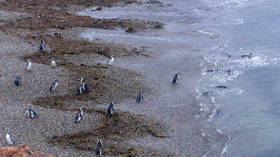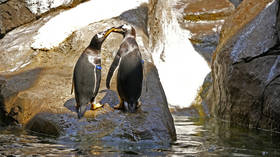
The deaths of 2,000 young Magellanic penguins have been blamed on overfishing and bad weather

FILE PHOTO © Getty Images / Mauro Flamini
Around 2,000 dead Magellanic penguins have washed up on the coast of Uruguay in the past ten days, authorities told AFP on Friday, acknowledging that the cause of death remains unclear.
Nine out of ten of the birds were juveniles who arrived with their stomachs empty and their fat reserves depleted, the head of the Environmental Ministry’s Department of Fauna, Carmen Leizagoyen, told the news outlet.
Fears that the die-off could be the result of bird flu proved unfounded, as none of the animals tested positive for the virus.

Read more
While a similar mass death took place last year in Brazil, the reasons remain unclear, and the number of dead birds is far from typical. “It is normal for some percentage to die, but not these numbers,” Leizagoyen said.
Some environmental NGOs blame overfishing, pointing to the starving condition of the penguins. Richard Tesoro of the NGO Marine Wildlife Rescue claimed the problem has been going on since the 1990s.
“The resource is overexploited,” he told AFP, adding that he had seen petrels, albatrosses, sea lions, sea turtles, and seagulls turn up on the beach in Uruguay’s Maldonado region.
Additionally, a subtropical cyclone off southeastern Brazil earlier this month may have finished off already-weakened birds.
Magellanic penguins normally migrate north from their nesting territory in southern Argentina, seeking food and warmer water.
More than 300 Magellanic penguins died in 2019 when an extreme heat wave struck Punta Tombo, one of their largest breeding colonies in Argentina’s Chubut Province. Temperatures climbed to 111.2 degrees Fahrenheit (44 Celsius), leaving many of the birds unable to reach the sea in time to properly cool themselves before dying of dehydration.
Hundreds of little blue penguins washed up in New Zealand last year, with the mass die-off attributed to starvation as the fish they typically eat had moved to deeper waters due to warming temperatures. While some blamed this on climate change, others countered that it was part of a naturally occurring cycle.




